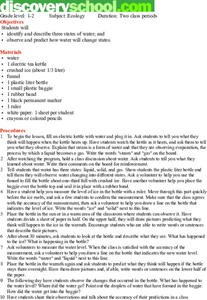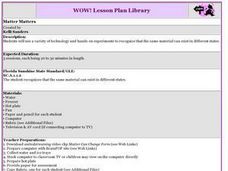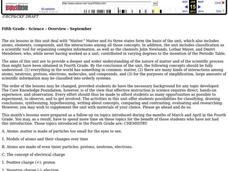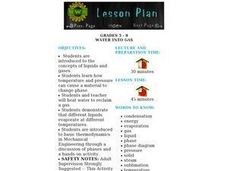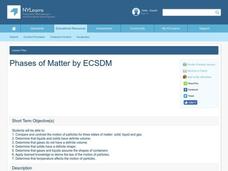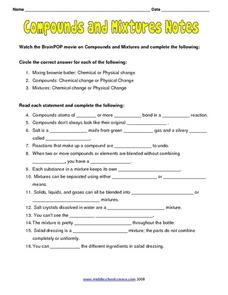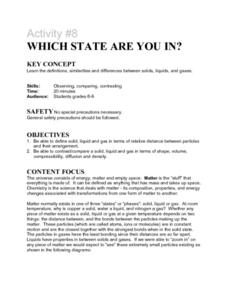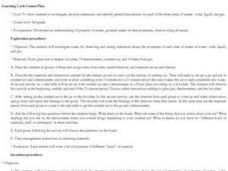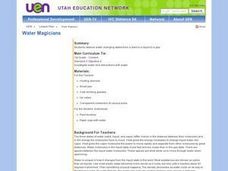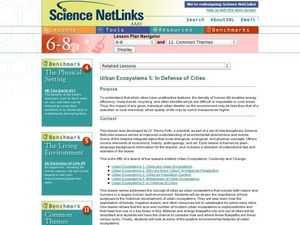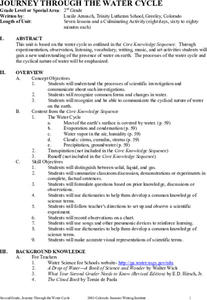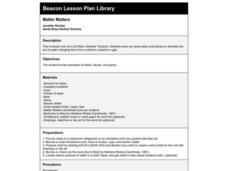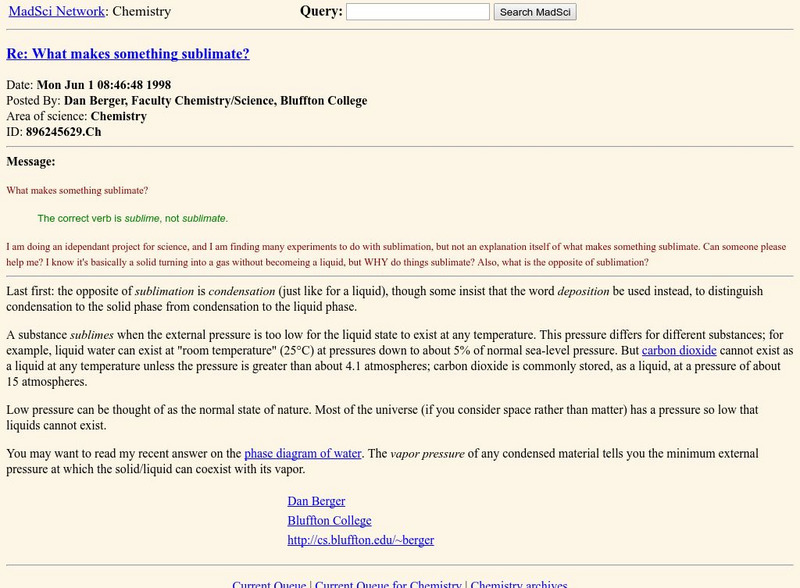Curated OER
Ecology
Students identify and describe three states of water. They predict how water will change states.
Curated OER
Matter Matters!
Second graders experiment with heating and cooling and research the states of matter (solid, liquid, gas).
Curated OER
State of Matter - Atoms
High schoolers examine and discuss how atoms change from solid to liquid to gas. They inflate a balloon by melting ice that converts to steam, and discuss the results.
Curated OER
What Is the Matter with Water?
Second graders observe matter in all 3 states : liquid, solid and gas, in an ice cream soda. In teams, they are given ice and teams compete to be the first to melt their ice. Winner gets the ice cream soda. They draw examples of 3 states...
Curated OER
Matter
Fifth graders investigate the nature of matter and of the scientific processes associated with them in this series of lessons.
Curated OER
Water Into Gas
Students investigate how temperature and pressure cause a material to change phase. They heat water to reclaim a gas. They demonstrate that different liquids evaporate at different temperatures.
Curated OER
Phases of Matter
Students describe the motion of solids, liquids and gases. In this chemistry instructional activity, students describe how temperature affect motion of the particles. They determine the physical properties of each phase.
Curated OER
What's the Matter?
Students investigate matter. In this matter lesson, students identify types of matter and characteristics of each type. Students discuss matter and create matter posters to show understanding.
Curated OER
Compounds and Mixtures Notes
In this matter worksheet, students watch a movie and then compare the differences between compounds and mixtures. This worksheet has 16 fill in the blank questions.
Curated OER
What Are Physical Changes in Matter?
In this matter worksheet, students write down 3 causes and effects of physical changes in matter. This worksheet is a graphic organizer.
Curated OER
What is a Physical Change in Matter?
In this matter worksheet, students complete a graphic organizer by writing in 1 thing that causes a physical change in matter and 3 effects this has on matter.
Curated OER
Matter - Chapter 2 Physical Changes
In this matter worksheet, students identify words and match them to their definition. Students identify words dealing with matter, its physical changes, and the effect of heating and cooling matter. This worksheet contains nine...
Curated OER
Chemistry: Plastic Milk
Students observe a basic chemical reaction as vinegar is mixed with skim milk and microwaved. First, they listen to the teacher read, "Little Miss Muffet," and discover the meaning of curds and whey. While the experiment have an...
Curated OER
Activity #8 Which State Are You In?
Students define, give similarites and differences between solids, liquids, and gases. They compare and contrast a solid, liquid and gas in terms of shape, volume, compressibility, diffusion and density. Pupils classigy common...
Curated OER
Activity #9 A State Debate!
Students list individual properties of solids, liquids, and gases. They examine that some properties have more than one state of matter. Pupils consider whether shaving cream, is a solid, a liquid, or a gas, or some combination.
Curated OER
Learning Cycle Lesson Plan
students investigate, develop inferences, and identify general descriptions for each of the three states of matter - solid, liquid, and gas. students investigate water, by observing and stating inferences about, the properties of each...
Curated OER
Let's Think About Water
Students explore the different forms that water can take and conduct simple experiments to demonstrate some of its properties in each state. They watch a short video that illustrates some of these concepts.
Curated OER
Hunting for Hidden Fat
Young scholars investigate the importance of fat in the diet. They determine the difference between solid and liquid fat. They examine food labels to identify the ones that contain fat.
Curated OER
Water Magicians
First graders observe water changing states from a solid to a liquid to a gas. They predict what they think happen to ice cubes as they sit out. They paint water with paintbrushes outside the classroom in the sun and watch the water...
Curated OER
Water and Ice
Students investigate what happens to solids and liquids when they change from one form to another. The amount od space taken by frozen water begins the discussion and students are led to formulate their own hypothesis to research.
Curated OER
Journey Through the Water Cycle
Students canvass the water cycle in the seven lessons of this unit. The processes of the water cycle and the cyclical nature of water is emphasized inthis unit.
Curated OER
Matter Matters
Second graders listen to a teacher read aloud introducing a unit about how water changes state. They investigate the state of water as it changes from a solid, to a liquid to a gas.
Curated OER
Water 3: Melting and Freezing
Students explore what happens to the amount of different substances as they change from a solid to a liquid or a liquid to solid.
MadSci Network
The Mad Scientist Network: Chemistry
The question: "What makes something sublimate?" is discussed and explained. Project ideas pertaining to sublimation are suggested.


